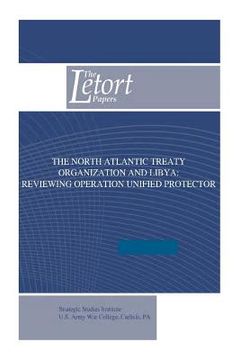The North Atlantic Treaty Organization and Libya: Reviewing Operation Unified Protector (en Inglés)
Reseña del libro "The North Atlantic Treaty Organization and Libya: Reviewing Operation Unified Protector (en Inglés)"
On March 17, 2011, 1 month after the beginning of the Libyan revolution and up to 2,000 civilians dead, the United Nations Security Council (UNSC) decided to back a no-fly zone over Libya and authorized "all necessary measures" to protect civilians. While France, Great Britain, and the United States took immediate military action using air and missile strikes, considerations to hand the mission to the North Atlantic Treaty Organization (NATO) emerged within days of the operation. On March 22, 2012, NATO agreed to enforce the arms embargo against Libya; 2 days later, it announced it would take over all military aspects of UNSC Resolution (UNSCR) 1973. On March 31, 2012, Operation UNIFIED PROTECTOR (OUP) began. For the first time in its history, NATO was at war with an Arab country.OUP turned out to be one of NATO's shorter, and seemingly also less controversial, missions. Mandated by both the League of Arab States and the UN as the regime of Colonel Muammar Qaddafi was launching assaults on peacefully demonstrating citizens, the mission had the aim to protect civilians from the air and sea. OUP has thus been described as a success-a success NATO badly needed after its decade-long engagement in Afghanistan. However, the Libyan operation was not without its critics. Described as a "war of choice" rather than a "war of necessity," it achieved its goals more by accident than by design, according to some commentators. Yet, the operation also exposed strategic shortcomings, which are analyzed in this monograph.First, in the public appraisal of the operation, air power was seen as the crucial element in winning the conflict. This view is only partially correct; just as air power works best when integrated with land forces, NATO's operation was, in part, decided by those forces engaged with the Libyan regime's forces-although both forces were not truly integrated. Nevertheless, overestimating the impact of air power can mislead decisionmakers in future conflict.Second, the operation exposed some flaws in NATO's command structure, which was under reform when the conflict erupted. Joint Force Command Naples (JFC-Naples), in charge of the operation, was not properly equipped for an actual crisis of this dimension, but managed to improvise on a large scale.Third, the Alliance paid very little attention to Libya's cultural terrain. They had no cultural advisers on the staff of OUP-no one from Libya nor from any other Arab country. Also, there was no one who was familiar with the local conditions. The improvised advice OUP relied on turned out to be a failure; as officers involved in the campaign admitted, nobody predicted several of the turns the operation took. Given that the ground component was crucial to the mission's success, cultural advice would have made an important contribution to the general understanding of the situation within Libya as the operation evolved.Fourth, there was some disconnect between the legal and the political solution of the crisis. As the legal interpretations of UNSCR 1973 made clear, the operation did not seek to topple Qaddafi's regime, let alone assassinate him. Its sole aim was the protection of civilians in a situation of internal conflict, and therefore it conformed to the norm of "Responsibility to Protect"; yet, against the backdrop of international political pressure, the Alliance's neutrality and its agenda quickly became a point of discussion.Fifth, the Libyan regime's strategic communication proved to be a lot more resilient and creative than NATO's strategic communication. It succeeded not only in recruiting a public relations firm for this purpose, but managed to escort BBC journalists into a hospital showing corpses of young children supposedly killed in NATO air strikes.

